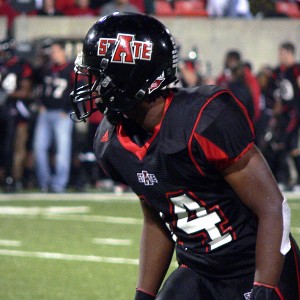 JONESBORO, Ark. — Following a firestorm of controversy over the issue, officials at Arkansas State University (ASU) have decided to allow members of the university’s football team to wear a cross decal on their helmets—as long as the players personally choose to affix them and pay for the stickers themselves.
JONESBORO, Ark. — Following a firestorm of controversy over the issue, officials at Arkansas State University (ASU) have decided to allow members of the university’s football team to wear a cross decal on their helmets—as long as the players personally choose to affix them and pay for the stickers themselves.
As previously reported, the decal was meant to serve as a memorial to former player Markel Owens and equipment manager Barry Weyer, who were both tragically killed this year—Owens in a car crash and Weyer in a shooting. Both men were professing Christians, so team members chose a cross for the decal as they thought that the use of the symbol was fitting. The decal bears the initials of Owens and Weyer, and is voluntary for any player who desires to affix the memorial to their helmet.
But after Jonesboro attorney Louis Nisenbaum saw the symbol on player’s helmets during a recently televised football game, he sent a letter to the university, asserting that the crosses presented a constitutional infringement.
“That is a clear violation of the Establishment Clause as a state endorsement of the Christian religion,” he wrote. “Please advise whether you agree and whether ASU will continue this practice.”
University attorney Lucinda McDaniel then reviewed the matter and advised Red Wolves’ athletic director Terry Mojahir that although she did not locate any case law that inferred that the decal must go, she was concerned that a lawsuit could arise out of the matter. She agreed with Nisenbaum that the crosses could be considered a government endorsement of religion, and suggested that players either remove the symbol or cut off the bottom of the cross so that it would look like a plus sign.
While Mojahir wanted to reject McDaniel’s instruction, he ultimately concluded that he must comply. A firestorm of controversy soon erupted nationwide after word broke that the decals would be altered or removed. Christian legal organizations such as the Liberty Institute and Liberty Counsel sent letters to the university to ask that the decision be overturned.
On Wednesday, McDaniel responded by allowing the decals to be used under the stipulation that students choose to utilize the decals of their own volition and that players pay for the decals with their own funds.
“In the interest of allowing our student-athletes to memorialize their fallen colleagues, Markel Owens and Barry Weyer, it is the university’s position that any player who wishes to voluntarily place an NCAA-compliant sticker on their helmet to memorialize these individuals will be able to do so,” she wrote.
She asserted that the head coach had initially selected the decals along with a few players that comprise the Leadership Council without consulting her first, and that public funds were to be used for their purchase—which caused the university to reach its original conclusion.
“The display of these stickers will be totally voluntary and completely independent of university involvement,” McDaniel advised of the plan moving forward. “The university will not procure the stickers, purchase them or affix them to the helmets.”
“This is a great victory for the players of Arkansas State University,” Liberty Institute litigation director Hiram Sasser remarked following the decision. “The university officials and the Arkansas attorney general did the right thing restoring the religious liberty and free speech rights of the players to have the original cross sticker design if they so choose and we commend them for doing so.”
Photo: Flirry Vorru
Become a Christian News Network Supporter...


